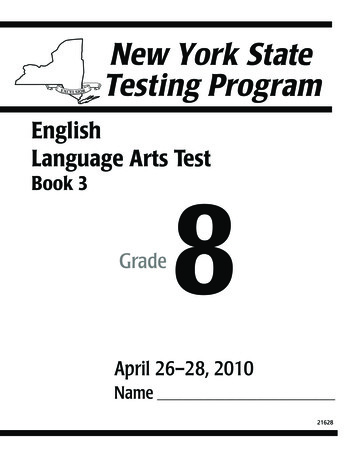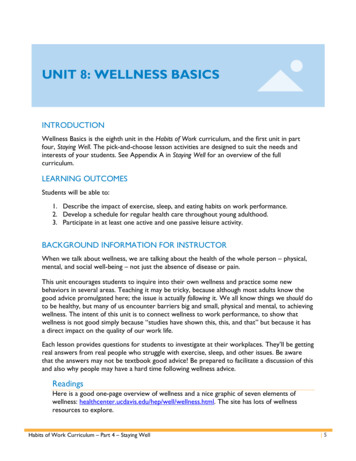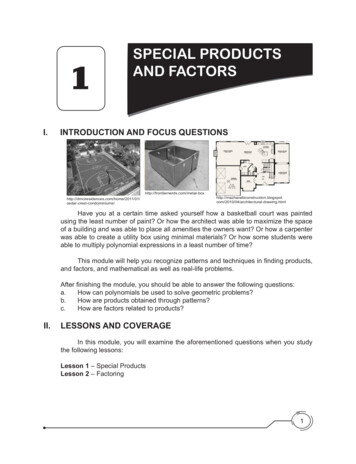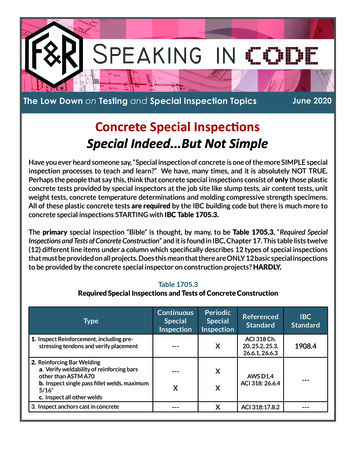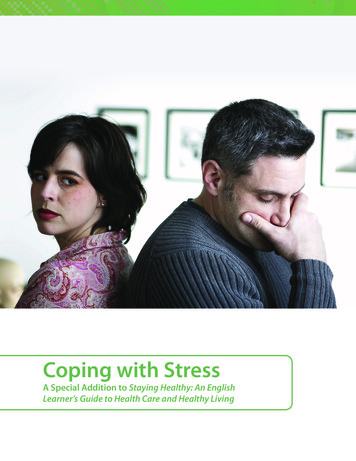
Transcription
Coping with StressA Special Addition to Staying Healthy: An EnglishLearner’s Guide to Health Care and Healthy Living
Coping with StressA Special Addition to Staying Healthy:An English Learner’s Guide toHealth Care and Healthy LivingNaomi Soto,Rhonda Atkinson,Gregory SmithFlorida Literacy CoalitionFlorida’s Adult and Family Literacy Resource Center2010This publication was made possible through a grant from theFlorida Department of Education, Division of Career and Adult Education.Funding was provided through the Workforce Investment Act, Title II,Adult and Family Literacy, Section 223.
ACKNOWLEDGEMENTSWe would like to acknowledge and thank the following individuals and organizations for their supportin the development of this publication.Florida Department of Education,Division of Career and Adult EducationExpert ReviewersBlue Cross and Blue Shield of FloridaMoran, M.A., Sean Jennings, Psy. D, and K. DayleDevelopment TeamNaomi Soto, Rhonda Atkinson, Gregory SmithAmy Hunter, Pam Fulton, Nancy Johnson, DiosaJones, PhDInvaluable OthersQuizaira Recio, Bryan McCormack, Erin Balleine,Health Literacy Program CoordinatorYari Payne, Raychel George, Sharon Smith, andNaomi SotoJordana FrostGraphic DesignCorey AlexanderCREDITSStock Photography and Illustrations byISTOCKPHOTO Copies of Staying Healthy: An English Learner’s Guide to Health Care and Healthy Living, and itsadditional components Women’s Health and Coping with Stress may be ordered by contacting theFlorida Literacy Coalition, Inc. at (407) 246-7110. This publication and all additional components canbe downloaded for free at http://www.floridaliteracy.org.The opinions expressed herein do not necessarily represent the positions or policies of the FloridaDepartment of Education. This resource is designed for educational purposes only. The information is notintended to substitute for informed medical advice. You should not use this information to diagnose ortreat a health problem or disease without consulting a doctor or qualified health care provider. This bookprovides links to websites to help you find health information and services. Florida Literacy Coalition doesnot necessarily endorse or recommend the organizations that produce these websites or the informationthey provide.
Everyday StressesWhat is Stress?Everyone has stress. Stress is your body’s response to a change ordifficult situation. It is a natural response.There are events everyday that require your attention. Some aredangerous and need immediate attention, like when you arealmost hit by a car. Big changes like getting married or movingcan be stressful, too.DangerousSituationsHassles are the little things that can bother us, like catching manyred lights when you are driving or forgetting to take out thegarbage. When we have a lot of stress in our life, hassles maybother us more than usual. If you find yourself getting very upsetover little things, you might have too much stress in your life.We can’t avoid stress. It is part of life. You need to know how tocope with stress. Knowing how to cope with stress helps youprepare for anything that comes your way.BigChangesThis chapter will answer these questions:FinancialWorries What is stress?Where does stress come from?How does stress affect my health?How can I cope with stress?01
What Happens When I’m Stressed?When a stack of books looks like it might fall on you, youjump out of the way. Suddenly, your heart beats fast.Your breathing is faster, too.If this happens, it means your body reacted. This is calledthe stress response. This reaction kept you from gettinghurt. You may feel your blood pressure go up and yourmuscles get tense. You may also begin to sweat too.The stress response is also called the fight-or-flightresponse. Your body prepares to defend you or run awayfrom any given situation.Where Does Stress Come From?Any change or demand can be a stressor. Somechanges or needs in life are bad. If you lose a job, youmay need to find a new one. A death in the familymay change your life. A car wreck may causeinjuries. These are bad stressors.Some changes or challenges in life are good.Getting married is a good thing. Getting married mayalso change your life. A new baby is good. But newbabies are demanding. These things can change yourlife in a good way. They are also stressors.Your body may not tellthe difference betweengood and bad stressors.It may react the same way!02Co p i n g w i t h St ress
How Long Does Stress Last?There are many common stressors. Some last only a short time. This iscalled acute stress. Examples of acute stressors include arguing with afriend, celebrating a holiday, or getting a flat tire.Acute stress can end when a problem ends.Some stressors continue for a long time. This is called chronic stress.Examples of chronic stressors include raising children, lack of jobbenefits, and money worries.You don’t have just one kind of stressor or the other. Acute andchronic stressors can occur at the same time. It is not always easyto cope with both stresses at the same time.Sometimes we can predict stressors. If work gets very busy or theholidays are stressful, you can prepare yourself so that the stress isnot so big. Other times we do not know when a stressor will affectus. If your child suddenly gets very sick, you were probably notexpecting that. It can be helpful, though, if you already haveregular ways to cope with stress.Stress Can Be AnywhereStress can occur in many different places in your life. Often times something that is stressful in onepart of your life can cause stress in other parts, too. For instance, if you are stressed out at workbecause of your co-workers or boss, you may still feel angry and upset when you get home. Thework stress can then affect your family life.Knowing what stresses you allows you to make positive changes to cope with the stress.Different Events That May Be Stressfuldeath of a family memberbeing overweightdivorce or separationnew jobthe holidaysagingpregnancychronic illnessdangerous weather like hurricanessleeping too little03
How Can Stress Affect My Health?Stress can wear your body out. It can hurt your health. Thefirst symptoms are often small. You might have moreheadaches. You might have stomach aches. You might haveproblems sleeping.Over time symptoms can get worse. You can get a lot of colds.Sores may not heal quickly. You can get very sad, sick, ordepressed. You can have difficulty getting pregnant.The effects of stress can be dangerous. Chronic stress cancontribute to high blood pressure, heart disease, strokes, anddiabetes. If you are pregnant, it can even affect your baby.The baby may come early. The baby may be very weak if it isborn too early.Stress can also affect your thinking. It may affect what you do, too. These symptoms interact andaffect each other. Here are ways that stress can affect you:HOW YOUR BODY FEELSWHAT YOU THINKWHAT YOU DOAches and painsSadnessDoubtsConstant worryingAngerFearNegative thoughtsWorry about healthGuiltConfusionNo confidenceEating more or lessUpset stomachFeeling dizzyChest painHigh blood pressureLoss of sex driveGetting colds oftenBreathing problemsTrouble sleepingSkin problemsShaky musclesSweatingTurning red04Nervous habits(nail biting, pacing)Using alcohol, cigarettes, ordrugs to relaxCannot relaxCannot concentrateAvoiding peopleor projectsCannot make choicesSloppy workFightingArguingMissing workHeartburnBuying things youdon’t needDiarrheaCryingCo p i n g w i t h St ress
How Can I Cope with Stress?You will always have stress. The key is how you cope withit. Coping helps take away the bad effects of stress. Thereare four basic ways to cope. The one(s) you use depends onthe stressor. It depends on you, too. You can figure out whatworks for you. If you have trouble knowing what works foryou, a mental health counselor may be able to help you. Accept the stressor Avoid the stressor Change the stressor Change yourself or the way you think about the stressorStressors You May Need to AcceptYou cannot avoid all stressors. Sometimes the best thing to do is to accept them. But you can learnto cope with that stress. Death, for instance, is unavoidable. It is up to the living to learn how tocope with the feelings that they have when someone dies.Having a support system may help. Family and friends who understand your grief can help youaccept the death of someone close to you. Some people go to church or turn to their faith to helpthem.Stressors You May Need to AvoidYou can cope with some stressors by avoiding certainplaces or people. You might not have enough moneyfor bills because you shop too much. You can changeyour behavior. You can take just enough cash to payfor what you need. You can also use coupons.Sometimes you are so busy you feel stressed.Learning to say no to people is not always easy, butsaying no can reduce your stress. This helps you takecare of your health.05
Stressors You May Need to ChangeYou may need to make changes in your life to cope withsome stressors. Change is not always easy. But changemay be the best way to cope with stressors. If you weightoo much, eating better and getting exercise is probablythe change you need. You can be healthier and removeyour stressor!If work stresses you too much, you may want to trychanging jobs. You might find a job you like more.Changing your stressor by changing what you do ingood ways is better for you.Change How You Think about aStressorChanging how you think about a person or situation maytake more work. But, changing your view can change orremove a stressor. There are many ways you can look ata problem or person. Try to keep a positive outlook. Forinstance, if you get laid off, don’t think you will never getanother job. Focus on the future. Your next job can bebetter for you.When stressors are big, it may be helpful to take a bigproblem and break it down into smaller problems. Forexample, someone might think, “ I cannot learn English.It is too hard. There are so many words to know.” Takethis problem and change the way you think about it bysaying, “I do not have to learn English in one day. Today Iwill learn five words of English. Tomorrow I will learn fivemore words.”You will always have stress.The key is how you cope with it.06Co p i n g w i t h St ress
Good Ways to Cope With StressThere are good ways to cope with stress. Some can be done rightaway and others take more time. Here are some things you cando to cope with stress in a healthy way: Exercise releases tension from the body. Having a support system of family and friends helps youfeel better. Let go of negative thoughts with positive self-talk. Do something relaxing, like deep breathing, stretching,listening to music, reading, or a hot bath. Learning more about stress helps you cope better. Being flexible lets you try and learn new things. Writing in a journal helps you think about your feelings. A hobby you enjoy may make you feel better. Get a good night’s sleep. Prioritize your time and know your limitations. Simplify your life. Focus on one task at a time. Do not compare your life to others.Bad Ways to Cope With StressThere are also bad ways to cope with stress. These may makeyou feel better for a little while. Over time, they make thingsworse. These include: Eating too much or too little Smoking or chewing tobacco Gambling Spending too much money Drinking alcohol Using drugs Watching too much TV Putting off things you must do Staying away from others Sleeping too much Taking out stress on others (blaming, arguing, fighting)07
What Else Can I Do to Cope With Stress?A lot of stress comes from what we tell ourselves. What we say can make stress worse. What we saycan reduce stress.Replacing Negative Self Talk with Positive Self TalkREPLACE THIS THOUGHT.WITH THIS THOUGHTI’m never going to finish this.Step by step, I will finish what I need to do.I hate my job.There are things I like about my job.I have so many bills to pay. I’ll buysomething to make myself feel better.I have a lot of bills to pay. How can I reduce myexpenses or make more money to pay forthe things I need?My boss is so unfair. I have moreresponsibilities than anyone else.My boss must think I am really good at what I do.I have more responsibilities than anyone else.I can really show that I am a valuable employee.I’m so lonely. No one ever calls me.I bet there are lots of people that need help.Where could I volunteer my time?When to Get CounselingIf your stress is too high, you may needprofessional help. There are people calledtherapists and mental health counselors whocan help you cope with your problems. Oftentimes talking to an objective person can shine anew light on a problem or stressful situation. Atherapist or mental health counselor may helpeven if a situation is not a problem, but you justwant someone to talk to.If the stress gets to be too much, or you arethinking of ending your life, please seek helpright away!SUICIDE HOTLINE NUMBER1-800-SUICIDE or 1-800-273-TALKTO FIND SERVICES IN YOUR Co p i n g w i t h St ress
How Can I Learn More?InformationPreventing Burnouthttp://helpguide.org/mental/burnout signs symptoms.htmCoping with Stresshttp://www.holisticonline.com/stress/stress home.htmManage opic.aspx?topicID 45&areaID 0Help for rets-of-happy-couplesActivitiesHealthy laxation.htmOnline Relaxation Stress Relievers: Fun and Games for Managing Stresshttp://stress.about.com/od/funandgames/Fun and Games for Managing Stress.htmRelaxation Techniques for Stress Reliefhttp://helpguide.org/mental/stress relief meditation yoga relaxation.htm#responseGuided Imageryhttp://www.holisticonline.com/stress/stress visualization.htmStress ://helpguide.org/mental/stress management relief coping.htmTop 10 Tension Reducing ques/tp/toptensionacts.htmFamily Activitieshttp://family.go.comFree or Low Cost Services211 Information and Referral Searchhttp://211.org/Free Suicide and Crisis Hotlinehttp://suicidehotlines.com/florida.html09
COPING WITH STRESS STUDENT EDITION - GLOSSARYWord &Pronunciation10DefinitionYou Can FindIt Hereacute stressah KEWT STRA essstressors that only last for a short time, like gettinga flat tire3chronic stressCRON ick STRA essstressors that continue for a long time, like moneyworries3depressionDEE pres SHUNfeeling very sad or bad4fight or flight responseFAHyt or FLYyt REE sponsbody prepares to defend or run away from astressful situation2flexibilityFLEX eh bill eh TEEbeing willing to change and adapt to situations7hasslesHASS ulslittle things that can bother us and become biggerissues when stress is high1hobbiesHOB beesactivities that are enjoyable like running or painting7mental health counselorMEN tal HELLth COUNS sa lira professional who helps people cope withemotional and personal matters8positive self-talkPOS sa TIV self - TA LLkchanging the way you think to let go of negativeenergy7, 8relaxREE laxfinding something that can calm your nerves likelistening to music, a hot bath, or deep breathing7stressSTRA essbody’s reaction to a change or difficult situation1-11stressorSTRA ess ERRany change or demand, good or bad2-11stress responseSTRA ess REE sponsbody’s reaction to change or a difficult situationsupport systemSUP ort SIS temfamily or friends that help you in stressful situationsby listening and understanding your feelingstherapistTHARE ah pISTa professional who helps people cope withemotional and personal mattersCo p i n g w i t h St ress25, 78
Florida Literacy Coalition, Inc.Florida’s Adult and Family Literacy Resource Center250 N. Orange AvenueSuite 1110Orlando, FL 32801(407) 246 - 7110www.floridaliteracy.orgThis publication was made possible through a grant from theFlorida Department of Education, Division of Career and Adult Education
example, someone might think, " I cannot learn English. It is too hard. There are so many words to know." Take this problem and change the way you think about it by saying, "I do not have to learn English in one day. Today I will learn five words of English. Tomorrow I will learn five more words." You will always have stress.

